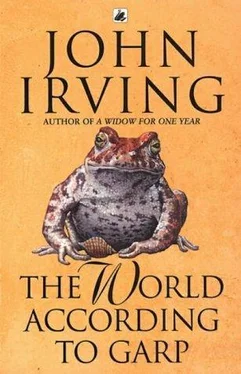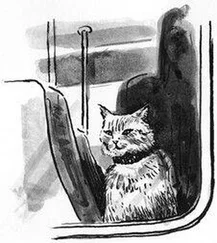Her working name was Charlotte. She was not surprised to see him. Charlotte was old enough to know when she'd successfully hooked someone, although she never did tell Garp exactly how old she was. She had taken very fine care of herself, and only when she was completely undressed was her age apparent anywhere except in the veins on her long hands. There were stretch marks on her belly and her breasts, but she told Garp that the child had died a long time ago. She did not mind if Garp touched the Cesarean scar.
After he had seen Charlotte four times at the fixed first-district rate, he happened to run into her at the Naschmarkt on a Saturday morning. She was buying fruit. Her hair was probably a little dirty; she'd covered it with a scarf and wore it like a young girl's—with bangs and two short braids. The bangs were slightly greasy against her forehead which seemed paler in the daylight. She had no makeup on and wore a pair of American jeans and tennis sneakers and a long coatstyle sweater with a high roll collar. Garp would not have recognized her if he hadn't seen her hands clutching the fruit; she had all her rings on.
At first she wouldn't answer him when he spoke to her but he had already told her that he did all the shopping and the cooking for himself and his mother, and she found this amusing. After her irritation at meeting a customer in her off-duty hours, she seemed good-humored. It did not become clear to Garp, for a while, that he was the same age as Charlotte's child would have been. Charlotte took some vicarious interest in the way Garp was living with his mother.
“How's your mother's writing coming?” Charlotte would ask him.
“She's still pounding away,” Garp would say. “I don't think she's solved the lust problem yet.”
But only to a point did Charlotte allow Garp to joke about his mother.
Garp was insecure enough about himself with Charlotte that he never told her he was trying to write, too; he knew she would think he was too young. Sometimes, he thought so, too. And his story wasn't ready to tell someone about. The most he had done was change the title. He now called it “The Pension Grillparzer,” and that title was the first thing about it that solidly pleased him. It helped him to focus. Now he had a place in mind, just one place where almost everything that was important was going to happen. This helped him to think in a more focused way about his characters, too. About the family of classifiers, about the other residents of one small, sad pension somewhere (it would have to be small and sad, and in Vienna, to be named after Franz Grillparzer). Those “other residents” would include a kind of circus; not a very good kind, either, he imagined, but a circus with no other place to stay. No other place would have them.
In the world of ratings, the whole thing would be a kind of C experience. This kind of imagining got Garp started, slowly, in what he thought was a real direction; he was right about that, but it was too new to write it down—or even to write about it. Anyway, the more he wrote to Helen the less he wrote in other, important ways: and he couldn't discuss this with his mother: imagination was not her greatest strength. Of course, he'd have felt foolish discussing any of this with Charlotte.
Garp often met Charlotte at the Naschmarkt on Saturdays. They shopped and sometimes they ate lunch together in a Serbian place not far from the Stadtpark. On these occasions Charlotte paid for herself. At one such lunch Garp confessed to her that the first-district rate was hard for him to pay regularly without admitting to his mother where this steady flow of money was going. Charlotte was angry at him for bringing up business when she wasn't working. She would have been angrier if he'd admitted that he was seeing less of her, professionally, because the sixth-district prices of someone whom he met at the corner of Karl Schweighofergasse and Mariahilfer were much easier to conceal from Jenny.
Charlotte had a low opinion of her colleagues who operated out of the first district. She'd once told Garp she was planning to retire at the first sign that her first-district appeal was slipping. She would never do business in the outer districts. She had a lot of money saved, she told him, and she was going to move to Munich (where nobody knew she was a whore) and marry a young doctor who could take care of her, in every way, until she died: it was unnecessary for her to explain to Garp that she had always appealed to younger men, but Garp thoroughly resented her assumption that doctors were—in the long run—desirable. It may be this early exposure to the desirability of doctors that caused Garp, in his literary career, often to people his novels and stories with such unlikely characters from the medical profession. If so, it didn't occur to him until later. There is no doctor in “The Pension Grillparzer.” In this beginning there is very little about death, either, although that is the subject the story would come to. In the beginning Garp had only a dream of death, but it was a whale of a dream and he gave it to the oldest person alive in his story: a grandmother. Garp guessed this meant that she would be the first to die.
The Pension Grillparzer
My father worked for the Austrian Tourist Bureau. It was my mother's idea that our family travel with him when he went on the road as a Tourist Bureau spy. My mother and brother and I would accompany him on his secretive missions to uncover the discourtesy, the dust, the badly cooked food, the shortcuts taken by Austrian restaurants and hotels and pensions. We were instructed to create difficulties whenever we could, never to order exactly what was on the menu, to imitate a foreigner's odd requests—the hours we would like to have our baths, the need for aspirin and directions to the zoo. We were instructed to be civilized but troublesome; and when the visit was over, we reported to my father in the car.
My mother would say, “The hairdresser is always closed in the morning. But they make suitable recommendations outside. I guess it's all right, provided they don't claim to have a hairdresser actually in the hotel.”
“Well, they do claim it,” my father would say. He'd note this in a giant pad.
I was always the driver. I said, “The car is parked off the street, but someone put fourteen kilometers on the gauge between the time we handed it over to the doorman and picked it up at the hotel garage.”
“That is a matter to report directly to the management,” my father said, jotting it down.
“The toilet leaked,” I said.
“I couldn't open the door to the W.C.,” said my brother, Robo. “Robo,” Mother said, “you always have trouble with doors.”
“Was that supposed to be Class C ?” I asked.
“I'm afraid not,” Father said, “it is still listed as Class B.” We drove for a short while in silence; our most serious judgment concerned changing a hotel's or a pension's rating. We did not suggest reclassification frivolously.
“I think this calls for a letter to the management,” Mother suggested. “Not too nice a letter, but not a really rough one. Just state the facts.”
“Yes, I rather liked him,” Father said. He always made a point of getting to meet the managers.
“Don't forget the business of them driving our car,” I said. “That's really unforgivable.”
“And the eggs were bad,” said Robo; he was not yet ten and his judgments were not considered seriously.
We became a far harsher team of evaluators when my grandfather died and we inherited Grandmother—my mother's mother, who thereafter accompanied us on our travels. A regal dame, Johanna was accustomed to Class A travel, and my father's duties more frequently called for investigations of Class B and Class C lodgings. They were the places, the B and C hotels (and the pensions), that most interested the tourists. At restaurants we did a little better. People who couldn't afford the classy places to sleep were still interested in the best places to eat.
Читать дальше












